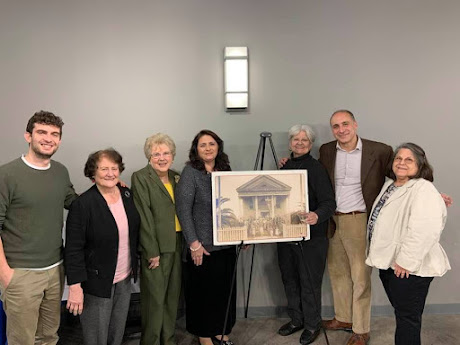Dear Friends and Colleagues –
Join us for EMBCA's “The Hellenic Revolution and its Effects on the American Abolitionist Movement ” Panel Discussion Webinar on Sunday, February 21 at 2 P.M. EST (11 A.M. PST, 9 P.M. Athens EEST). The panel for this unique event will be introduced and moderated by Lou Katsos, EMBCA's President/Founder and who will be part of the panel. The distinguished panel, in formation, will include Author/Poet Nicholas Alexiou, Professor of Sociology and Director of the Hellenic American Project at Queens College, Author/Historian/Poet/Editor/Activist Dan Georgakas the Director of the Greek American Studies Project at the Center for Byzantine & Modern Greek Studies at Queens College, and Author/Historian/Activist Herb Boyd, Professor of the Black Studies Program at the City College of New York, CUNY.
As mentioned in previous EMBCA panel discussions this discussion will be a further elaboration on Lou Katsos and Prof. Alexiou's lecture conducted at Queens College’s Rosenthal Library on April 15, 2019, and widely hailed. It was organized by EMBCA, Prof. Nicholas Alexiou's The Hellenic American Project /Queens College Sociology Department and the Black History Month Committee of Queens College. In the program relating to the Hellenic Revolution of 1821 Lou and Nicholas made the main presentations on the “Contributions of African Americans in the Hellenic Revolution of 1821, and Early American Philhellenes Ushering the Abolition and Suffrage Movements” a topic on the Revolution rarely (if ever) discussed. This particular panel will focus in more depth on the American Abolitionist Movement as influenced by the Hellenic Revolution for Black History Month in February.
American Philhellenism by 1821 when the Hellenic Revolution broke out, although derived from European origins became more than just a philosophical intellectual movement. It caught America by storm and referred to as the Greek Fever/ Greek Fire historically in the U.S.. It was influenced and inspired in part by America's contact with the Ottoman Empire and the Barbary States but also from their missionary and commercial interests that led to its first military conflicts abroad relating to the Barbary Wars, America's first wars. Americans also knew the Hellenes as slaves in the East, and also as fellow warriors in America's first battle and victory on foreign soil in the Battle of Derma (1805). U.S. Marines and the Greek mercenaries who supported them inspired the U.S. Marines' Hymn line " To the shores of Tripoli..". When the Hellenic Revolution broke out, and through the effort of many throughout the United States, Greek Committees were formed rapidly to support the effort financially and in some cases Americans went to Greece to fight. They included for example George Jarvis, a New Yorker (known as "Kapetan Zervos"), Captain Jonathan P. Miller, of Vermont, (who adopted Loukas Miltiades Miller the first American of Hellenic origin to be elected to the U.S. Congress), Dr. Samuel Gridley Howe who became the Chief Surgeon of the Hellenic Navy, George Wilson of Providence, Rhode Island, James Williams, an African American from Baltimore who joined the Greek Navy forces and fought died and is buried in Argos, Greece and others. Many who fought in Greece and others who were members of the Greek Committees became and were serious abolitionists in America and significant opponents of American slavery and which included Samuel Gridley Howe (one of the Secret Six), Jonathan Miller among many. We will explore some of them in this discussion as well as Hellenes who came into the U.S. in some cases as orphans of the Revolution, such as John Zachos, who themselves became American abolitionists and fought in the U.S. Civil War.. We hope this panel discussion and conversation contributes to a wave of research and continuing discussions on this very important but not often, if ever, discussed topic.
This event and others we have had, and are being planned are part of EMBCA’s American Hellenic Revolution of 1821 Bicentennial Committee series of events focusing not only on the Revolution but also importantly on the American, Diaspora and International aspects and influences of the Revolution for its 200 Year Anniversary.
UPCOMING EMBCA EVENTS
February 21 - "The Hellenic Revolution and its Effect on the American Abolitionist Movement" Panel Discussion Webinar
february 25- “NYC Office of Administrative Trials and Hearings (OATH) EMBCA Community Service Event”
February 28 - "Virtual Reality Training for High Risk Engagements From the Hellenic Revolution to Today’s Evolution" Panel Discussion Webinar
March 7 - "The Legacy of the Hellenic Diaspora in the Hellenic Revolution of 1821" Panel Discussion Webinar
March 14 - "The Hellenic Revolution and its Effects on the American Women's Suffrage Movement" Panel Discussion Webinar
March 28 - "Hellenic Energy Independence Forum - Part 2" Panel Discussion Webinar
April 11 - "The Effects of the Hellenic Revolution on Medicine, Health & Wellness in Greece, America, and Europe" Panel Discussion Webinar









